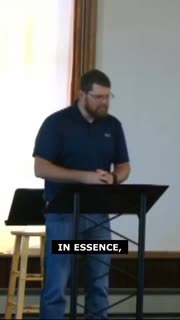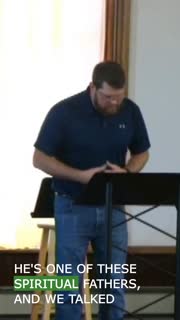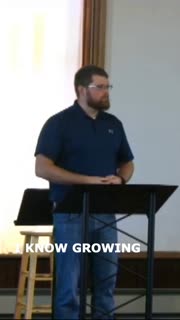Embracing Spiritual Growth and Accountability in Christ
Devotional
Sermon Summary
Bible Study Guide
Sermon Clips
1. "Paul starts this particular passage as we have broken it down in verse 14, saying, I don't write these things to make you ashamed. And so right away, some of my thoughts were, okay, what has Paul written that could make these people feel ashamed? If you were to look back over this whole chapter, not this whole chapter, but the book so far, he's said a few things that at face value could come across pretty harsh, could feel a little straight to the chase. And it's a little bit uncomfortable for us sometimes. We tend to kind of like to skirt around issues and tiptoe around confrontation, and Paul didn't really have an issue coming out and saying it." [00:00:00] (37 seconds)
2. "It's like, I'm not writing this to shame you. And you can understand where in some ways, coming out of the gate in this reading this letter, this church might be feeling like, man, Paul's down our throats right now. He's really getting after us. He's calling it like it is. He's not holding punches. And here he's saying, look at all this stuff that they're doing, that he's doing as a leader. And if we're a little honest, if someone gets up and starts talking about how they sacrifice and are serving and all that, and you're not measuring up to an equal thing, that could bring a level of shame. He's like, listen, I'm not trying to shame you. I'm trying to admonish you. And there's a difference here." [00:02:49] (39 seconds)
3. "The ball's in your court. It's up to you what you're going to do with this. I can do only so much. You've got to pick up the ball and you've got to start doing something. You've got to take some ownership and take some responsibility. And so here's a couple of ways that that looks like as we're looking at the end of this chapter. Number one, if the ball's in your court, if you're going to start to engage in this, it starts by taking inventory. Taking inventory not just of the things that you've got at your house, but taking inventory of your spiritual life." [00:04:36] (33 seconds)
4. "In essence, what these guides were, just culturally speaking, not what he's trying to imply about these guides in the church, but culturally speaking, these guides kind of filled the role, if you were to translate it to today, of something like a nanny, something like a teacher. These were people who had an authority. They were given responsibility to look after and were involved in the bringing up of a child. So not all of us had nannies growing up, but if you had a nanny, that nanny might have been involved. They kind of parented you to an extent as a kid." [00:05:52] (37 seconds)
5. "He's one of these spiritual fathers, and we talked about that a little bit last week, right? What are those kind of qualifications, or what, last week we talked about it under the lens of having the right rubric. How do you properly assess spiritual leaders? And we talked about things like looking for character over charisma. We talked about the quality of faithfulness being more important than the quantity of their following. We talked about looking at how they're equipping the church, rather than how they're entertaining the church." [00:09:48] (31 seconds)
6. "Paul's saying, as your spiritual father, I'm willing to sit down. Let's have the chat. Let's talk about this. In verse 16, he goes on and says, it's not only that, not only am I willing to have those conversations, not just do I care about you, but I'm living in such a way that I could invite you to imitate me, to live as I'm living. All right, if you follow my example, Paul's saying, I want you literally to mimic me. That's what he's getting to. He's not just some guy who's talking." [00:11:12] (29 seconds)
7. "I know growing up when I was learning how to drive, right? What's the one thing that maybe you've said it as a parent? Maybe you've heard it said, do as I say, not as I do. You're like, I recognize that now looking back. There were times where my mom and dad were like, well, I'm setting an example. My example is not exactly consistent with what I am saying. And Paul's not here to say, hey, do as I say, not as I do. He's here to say, do as I say, yes. Also, do as I do, right? I'm living my life in such a way that it's consistent with what I say." [00:20:39] (41 seconds)
8. "The value to you of your spiritual leaders is only in as much as how you respond to them. I can set the example, Paul says. I can point you in the right direction. I can tell you what needs to happen. But at the end of the day, it's going to matter how you respond. This is why he says in 16, I urge you. He knows as well as anyone, he can't force anyone to do anything." [00:22:52] (38 seconds)
9. "responsibility if we're going to heed if we're going to take the inventory that that last part here verse 21 it really is guys paul's leaving in the ball is in their court it's like i i've laid it all out for you what are you going to do what are you going to do with his example what are you going to do with his admonishment what are you going to do with his teaching what are you going to do with all of those different things you need to take responsibility it's easy to look at those who are seen as spiritual leaders in your life and attribute a lot of blame or credit to them that's what's going on in corinth these people are saying i'm somebody because i'm i follow so and so paul's like you're giving too much credit on the flip side you can't blame their failures either because you're responsible at some point we're going to stand before the lord and like it or not we are not going to have the benefit all of us will not have the benefit of saying but so and so said but so and so did god's gonna say there's some responsibility that's on your" [00:23:53] (92 seconds)
10. "shoulders here so i say that today to encourage you to consider where you are at what areas of your life are you growing in spiritually what areas of your life are you lacking in or you maybe you've become stagnant in paul's saying it's time to take some responsibility and say i'm going to get in the game i'm going to start engaging in this way if this is what paul is my spiritual father is calling me to do if this is what my spiritual leaders are addressing i can choose i'm going to either engage or stay disengaged at some point you're going to have to take responsibility just like my mom says the ball is in your court doesn't mean my mom and dad weren't involved in my life for the next four years while i went through high school probably more than they ever were they were involved in my life but the ball's in your court jeremy at some point you can't assume that someone else is going to do it for you you need to take responsibility and that's where paul leaves it he's like i'm gonna come and when i do it's up to you are we going to hash this out when i get there am i going to come with a rod or when i get there we'll be able to enjoy a time of good fellowship of love with the spirit of gentleness your choice" [00:26:53] (88 seconds)
Ask a question about this sermon
2. "It's like, I'm not writing this to shame you. And you can understand where in some ways, coming out of the gate in this reading this letter, this church might be feeling like, man, Paul's down our throats right now. He's really getting after us. He's calling it like it is. He's not holding punches. And here he's saying, look at all this stuff that they're doing, that he's doing as a leader. And if we're a little honest, if someone gets up and starts talking about how they sacrifice and are serving and all that, and you're not measuring up to an equal thing, that could bring a level of shame. He's like, listen, I'm not trying to shame you. I'm trying to admonish you. And there's a difference here." [00:02:49] (39 seconds)
3. "The ball's in your court. It's up to you what you're going to do with this. I can do only so much. You've got to pick up the ball and you've got to start doing something. You've got to take some ownership and take some responsibility. And so here's a couple of ways that that looks like as we're looking at the end of this chapter. Number one, if the ball's in your court, if you're going to start to engage in this, it starts by taking inventory. Taking inventory not just of the things that you've got at your house, but taking inventory of your spiritual life." [00:04:36] (33 seconds)
4. "In essence, what these guides were, just culturally speaking, not what he's trying to imply about these guides in the church, but culturally speaking, these guides kind of filled the role, if you were to translate it to today, of something like a nanny, something like a teacher. These were people who had an authority. They were given responsibility to look after and were involved in the bringing up of a child. So not all of us had nannies growing up, but if you had a nanny, that nanny might have been involved. They kind of parented you to an extent as a kid." [00:05:52] (37 seconds)
5. "He's one of these spiritual fathers, and we talked about that a little bit last week, right? What are those kind of qualifications, or what, last week we talked about it under the lens of having the right rubric. How do you properly assess spiritual leaders? And we talked about things like looking for character over charisma. We talked about the quality of faithfulness being more important than the quantity of their following. We talked about looking at how they're equipping the church, rather than how they're entertaining the church." [00:09:48] (31 seconds)
6. "Paul's saying, as your spiritual father, I'm willing to sit down. Let's have the chat. Let's talk about this. In verse 16, he goes on and says, it's not only that, not only am I willing to have those conversations, not just do I care about you, but I'm living in such a way that I could invite you to imitate me, to live as I'm living. All right, if you follow my example, Paul's saying, I want you literally to mimic me. That's what he's getting to. He's not just some guy who's talking." [00:11:12] (29 seconds)
7. "I know growing up when I was learning how to drive, right? What's the one thing that maybe you've said it as a parent? Maybe you've heard it said, do as I say, not as I do. You're like, I recognize that now looking back. There were times where my mom and dad were like, well, I'm setting an example. My example is not exactly consistent with what I am saying. And Paul's not here to say, hey, do as I say, not as I do. He's here to say, do as I say, yes. Also, do as I do, right? I'm living my life in such a way that it's consistent with what I say." [00:20:39] (41 seconds)
8. "The value to you of your spiritual leaders is only in as much as how you respond to them. I can set the example, Paul says. I can point you in the right direction. I can tell you what needs to happen. But at the end of the day, it's going to matter how you respond. This is why he says in 16, I urge you. He knows as well as anyone, he can't force anyone to do anything." [00:22:52] (38 seconds)
9. "responsibility if we're going to heed if we're going to take the inventory that that last part here verse 21 it really is guys paul's leaving in the ball is in their court it's like i i've laid it all out for you what are you going to do what are you going to do with his example what are you going to do with his admonishment what are you going to do with his teaching what are you going to do with all of those different things you need to take responsibility it's easy to look at those who are seen as spiritual leaders in your life and attribute a lot of blame or credit to them that's what's going on in corinth these people are saying i'm somebody because i'm i follow so and so paul's like you're giving too much credit on the flip side you can't blame their failures either because you're responsible at some point we're going to stand before the lord and like it or not we are not going to have the benefit all of us will not have the benefit of saying but so and so said but so and so did god's gonna say there's some responsibility that's on your" [00:23:53] (92 seconds)
10. "shoulders here so i say that today to encourage you to consider where you are at what areas of your life are you growing in spiritually what areas of your life are you lacking in or you maybe you've become stagnant in paul's saying it's time to take some responsibility and say i'm going to get in the game i'm going to start engaging in this way if this is what paul is my spiritual father is calling me to do if this is what my spiritual leaders are addressing i can choose i'm going to either engage or stay disengaged at some point you're going to have to take responsibility just like my mom says the ball is in your court doesn't mean my mom and dad weren't involved in my life for the next four years while i went through high school probably more than they ever were they were involved in my life but the ball's in your court jeremy at some point you can't assume that someone else is going to do it for you you need to take responsibility and that's where paul leaves it he's like i'm gonna come and when i do it's up to you are we going to hash this out when i get there am i going to come with a rod or when i get there we'll be able to enjoy a time of good fellowship of love with the spirit of gentleness your choice" [00:26:53] (88 seconds)










